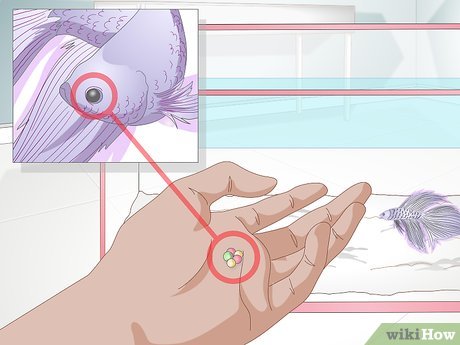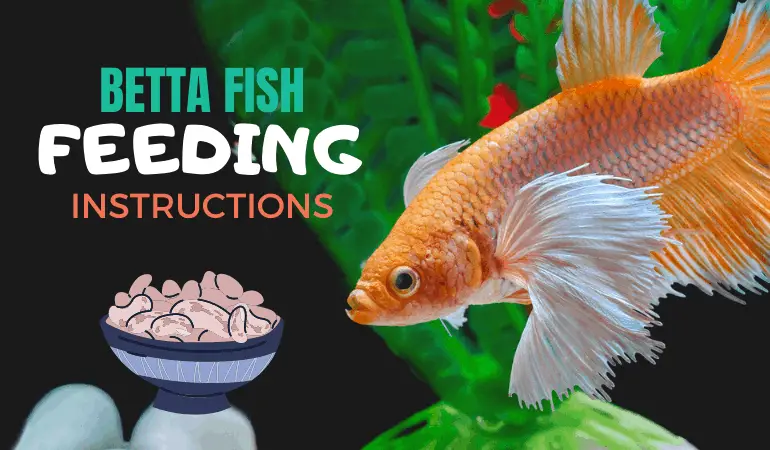Betta fish are one of the most popular freshwater aquarium fish known for their vibrant colors and stunning appearance. However, maintaining their health and well-being requires proper care and feeding. One of the most common questions among betta fish owners is whether they should feed their fish every day or not.
Feeding betta fish every day is a controversial topic, and there is no one-size-fits-all answer to it. While some experts recommend feeding them once or twice a day, others suggest skipping a day or two to prevent overfeeding and maintain a healthy diet. In this article, we will explore the pros and cons of feeding betta fish every day and provide you with some helpful tips to keep your betta fish happy and healthy.

Do You Feed Betta Fish Everyday? – Find Out Here!
How Often Should You Feed Your Betta Fish?
Betta fish, also known as Siamese fighting fish, are popular pets because of their vibrant colors and active personalities. However, when it comes to feeding them, many owners are unsure of how often to do so. The truth is, betta fish should be fed once or twice a day, with small portions that they can consume in a few minutes.
Overfeeding your betta fish can lead to health problems, such as constipation and swim bladder disease. Additionally, uneaten food can quickly dirty the tank and harm the water quality. Therefore, it’s crucial to stick to a consistent feeding schedule and monitor your fish’s behavior to ensure they are eating properly.
What Should You Feed Your Betta Fish?
In the wild, betta fish primarily feed on insects and small crustaceans. However, in captivity, they require a balanced diet that includes both protein and vegetables. Betta fish pellets are a popular option as they contain all the necessary nutrients and are easy to digest.
You can also supplement your betta fish’s diet with live or frozen foods, such as bloodworms or brine shrimp. However, it’s essential to only feed them these treats occasionally, as they can lead to overfeeding and potential health issues.
The Benefits of Feeding Your Betta Fish Properly
Feeding your betta fish a balanced diet has several benefits, including:
– Improved health and vitality: A proper diet can help prevent health issues and promote a long, happy life for your fish.
– Vibrant colors: A healthy betta fish will display bright, bold colors that are a delight to see.
– Increased activity: A well-fed betta fish will be more active and engaging, making them a joy to watch and interact with.
Betta Fish Feeding Tips
Here are some tips to ensure your betta fish is properly fed:
1. Stick to a consistent feeding schedule of once or twice a day, with small portions.
2. Monitor your fish’s behavior and adjust their feeding as needed.
3. Avoid overfeeding, which can lead to health problems and dirty tank water.
4. Use betta fish pellets as a staple diet and only feed live or frozen foods occasionally as a treat.
5. Clean any uneaten food from the tank to maintain water quality.
Betta Fish Feeding Vs. Other Fish
Compared to other fish, betta fish have a unique feeding routine. While some fish can be fed multiple times a day, betta fish require a more controlled diet to ensure their health and longevity. Additionally, their small stomachs and sensitive digestive systems require small, frequent feedings rather than one large meal.
Conclusion
In summary, feeding your betta fish once or twice a day with small portions of betta fish pellets is the best way to ensure their health and happiness. Supplementing their diet with live or frozen foods is okay as long as it’s done in moderation. By following these feeding tips, you can enjoy the vibrant colors and active personalities of your betta fish for years to come.
Freequently Asked Questions
Betta fish are one of the most popular aquarium fish due to their fascinating personalities and vibrant colors. As a responsible pet owner, it is important to know how to take care of your betta fish properly. One of the most common questions that betta fish owners have is whether they need to feed their fish every day. Here are the answers to some of the frequently asked questions about feeding betta fish.
Do you feed betta fish every day?
Yes, you should feed your betta fish every day. Betta fish are active swimmers, and they need a constant supply of food to maintain their health. However, you should be careful not to overfeed your fish as it can lead to obesity and other health problems.
Overfeeding can also cause the water in the aquarium to become cloudy, which can harm the fish. You should feed your betta fish small amounts of food two to three times a day. Make sure to remove any uneaten food from the tank after a few minutes to prevent it from decomposing and contaminating the water.
What should you feed betta fish?
Betta fish are carnivorous and require a diet that is high in protein. You can feed your betta fish a variety of foods, including pellets, frozen or live foods such as brine shrimp, bloodworms, and daphnia. You can also feed your betta fish small amounts of vegetables such as peas and spinach.
When choosing food for your betta fish, make sure to read the label carefully. The food should have a high protein content and be specifically formulated for betta fish. Avoid feeding your betta fish human food, as it can be harmful to their health.
How much should you feed betta fish?
You should feed your betta fish small amounts of food two to three times a day. The amount of food you feed your betta fish should be about the size of their eye. Overfeeding can lead to health problems such as bloating and constipation, so it is important to be mindful of how much you are feeding your fish.
If you are unsure about how much to feed your betta fish, you can consult with a veterinarian or a fish expert. They can provide you with guidance on the appropriate amount of food to feed your fish based on their size and age.
Can betta fish go without food for a few days?
Betta fish can survive without food for a few days, but it is not recommended. If you are going to be away from home for a few days, you should make arrangements for someone to feed your fish. Alternatively, you can use an automatic fish feeder that dispenses small amounts of food at regular intervals.
It is important to note that betta fish can become stressed if they are not fed regularly. This can lead to health problems and a shorter lifespan. Therefore, it is important to ensure that your betta fish is fed regularly.
What are the signs of overfeeding betta fish?
Overfeeding can lead to health problems such as bloating and constipation in betta fish. The signs of overfeeding include a distended belly, difficulty swimming, and a loss of appetite. If you notice any of these symptoms in your fish, you should reduce the amount of food you are feeding them and monitor their behavior.
It is important to maintain a healthy diet for your betta fish to ensure their overall health and wellbeing. By feeding them the appropriate amount of food and monitoring their behavior, you can help them live a long and healthy life.

How Often to Feed a Betta Fish
In conclusion, feeding Betta fish every day is not always necessary. While they do need a consistent source of food, overfeeding can lead to health problems. Bettas are small fish that have a small stomach capacity, so it’s important to provide them with small portions of food at a time.
It’s also important to consider the type of food you are feeding your Betta. A well-balanced diet that includes a variety of foods such as pellets, frozen or live foods, and vegetables is essential for their overall health and well-being.
In summary, it’s best to feed your Betta fish small portions of food, two or three times a day. A balanced diet that includes a variety of foods will provide them with the necessary nutrients and keep them healthy. Remember, a healthy Betta is a happy Betta!
